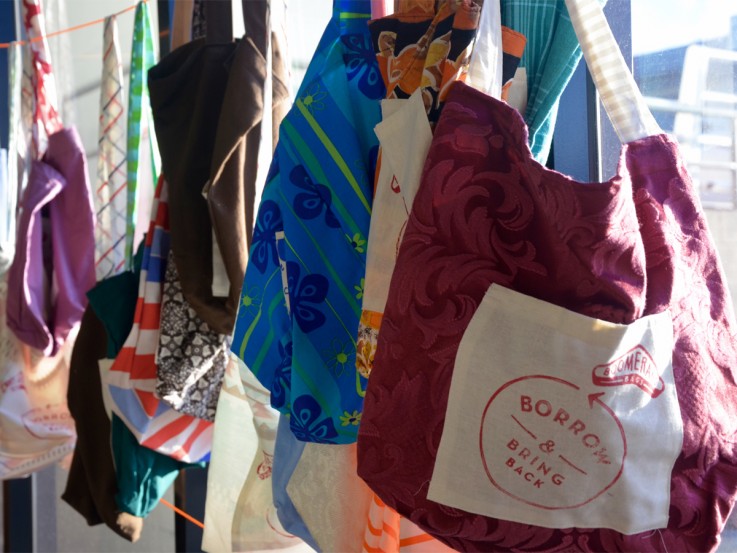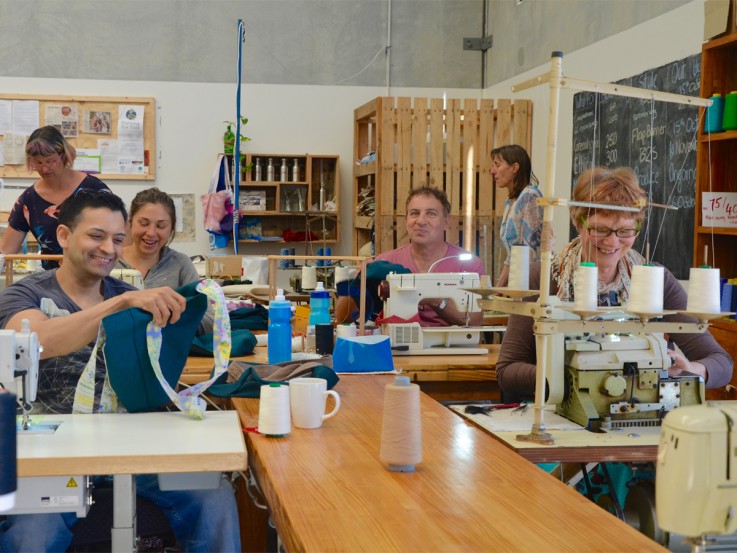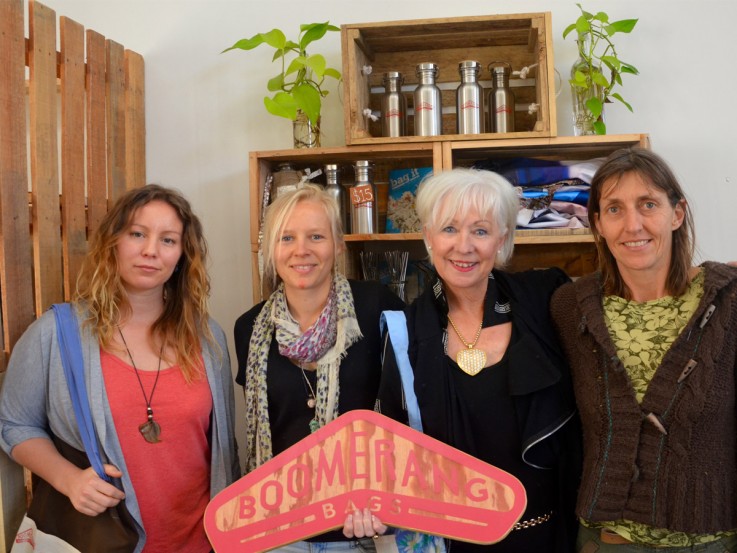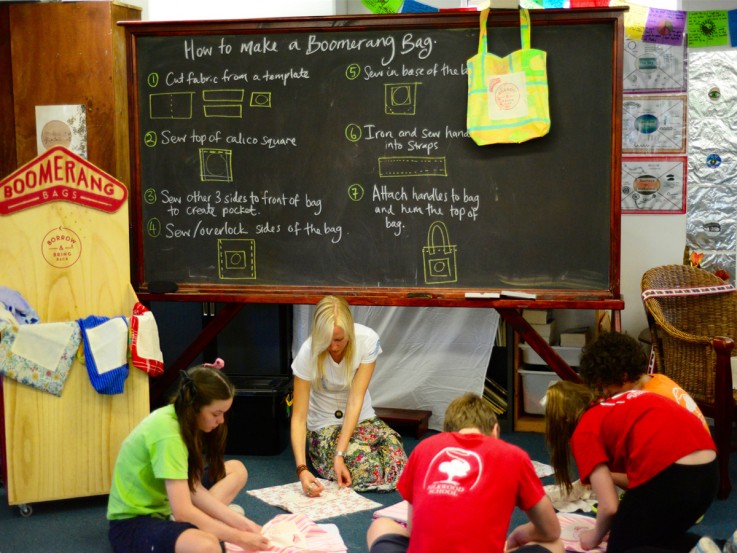Boomerang Bags – Sewing Sustainable Solutions
It’s estimated that up to one trillion plastic bags are consumed worldwide annually – that’s about one million plastic bags every minute. In recent years, increasing countries around the world have taken action to reduce reliance on plastic bags but many – including Australia - still lag behind. That’s where Boomerang Bags comes in, a not-for-profit aimed at tackling the plastics problem. We spoke to surfer, environmentalist and co-founder Jordyn de Boer to learn more.
What does Boomerang Bags do?
Boomerang Bags works to reduce the use of plastic bags by engaging local communities in making and using free, sustainable alternatives. Boxes of re-useable bags are placed in shopping areas that community members can ‘borrow and bring back’. Each bag is hand-made by volunteers, schools and community groups using donated second-hand materials.
How did the idea of Boomerang Bags come about?
Tania (Potts) and I started Boomerang Bags in 2013. We wanted to address the plastics problem at a grassroots level without the reliance of government enforcing legislative changes. The set-up took about eight months and with the help of a few hundred volunteers we made 2000 Boomerang Bags. We set out to target one local community but word soon got out and people across Australia started contacting us, so we developed a ‘How-to’ guide, which allows anyone to get started in their local area. It’s been two years and there are now 12 Boomerang Bags communities across Australia, with some interest from overseas as well.
Tell us about your background…
I started out in Environmental Science, which I studied at university on the Gold Coast and I worked in environmental consulting and research. I’ve been involved in volunteering for a few environmental groups, including Landcare, BeachCare and Conservation Volunteers Australia. I’ve also been active with Surfrider Foundation for a number of years, including President of the Gold Coast Chapter for two years and more recently, Partnerships Manager for Surfrider Australia.
What’s the most rewarding part of what Boomerang Bags does?
When I started I thought the reward would be the impact on reducing plastic use – Boomerang Bags volunteers have collectively made 12,600 bags since we started, which equates to reducing 6.5 million plastic bags – but the best part has been meeting so many amazing people along the way and the amount of community support that the project has gained. On the Gold Coast alone, we have 15 to 20 volunteers involved on a daily basis, including people from all walks of life and from 11 to 83 years of age.
What’s the hardest?
Not getting overwhelmed by the issue. At the beach and in the surf, plastic is still everywhere, but I try to keep my focus on the positive aspects. There’s been a massive shift in consciousness over the last few years and more people are becoming aware and looking for solutions, which is encouraging. The planet is asking for help and the problem is getting harder to ignore, I think people are feeling that.
What role do you think surfers should play when it comes to sustainability?
I think surfers and anyone using the ocean or environment for recreation and enjoyment should care for and appreciate the abundance that we’re provided with. We need to wake up and realise what that’s worth.
It’s human nature to want to feel a sense of purpose and everyone finds that in different things depending on where your passion lies. I get fulfilment from environmentalism.
What’s next for Boomerang Bags?
Our vision is to keep expanding the initiative into communities all around Australia and beyond. We don’t know when the government is going to step up and ban plastic bags so we’re trying to instigate change now at the grassroots level. There are a lot of issues that I’m passionate about, but I this one felt like achievable to start. Once the awareness is raised about the plastic issue, it seems to have a ripple effect and feeds into a lot of other sustainability issues.
How can others get involved or support Boomerang Bags?
There’s a number of ways people can get involved - head to our website to find out about volunteering, starting a community or donating materials. More generally, if people want to take action I suggest starting small and thinking about the way you use single-use plastics (plastic bags, water bottles, disposable coffee cups and plastic straws), things that we use on a daily basis. Those are some of the most common things found in our oceans, so switching to re-useable alternatives will have a significant impact.
Where can we find you online?
| Web: | boomerangbags.org |
| Facebook: | facebook.com/boomerangbags |
| Instagram: |
Plastic Stats & Facts
- Plastic bag litter symbolises the worst excesses of a throwaway consumerist society.
- The vast majority of plastic bags in use are high-density polyethylene (HDPE) bags, most commonly distributed by supermarkets and takeaway outlets.
- The average plastic bag is used for as little as 12 minutes.
- While the plastic bag’s usage is short-lived its impact on the environment definitely isn’t - it stays in the environment for up to 1000 years.
- The production of a plastic bag is extremely energy intensive. Fossil fuels are extracted and processed to provide the energy required for production, contributing to climate change.
Surfers Charging for Change Series
This article is the third in a series that we are penning which highlights some of the leaders in sustainable surfing practices and showcases the inspiring efforts of surfers around the globe tackling issues including; the eradication of plastics, clean water, empowerment through education and enabling greater access for surfers with disabilities, just to name a few. Stay tuned for the next instalment...
Surfers Charging for Change - Introduction
Surfers Charging for Change - Combating the Plastics Problem in Indonesia
Posted by: Jaclyn Knight, on October 8, 2015
Categories: Interviews
Latest Posts
Craig Sims - White Horses & Surfing Life Publisher
Luke Kennedy - Editor of Tracks Magazine
Simon ‘Swilly’ Williams - Surf Photographer
Jarra Campbell - the Bondi Alchemist
Greg Gordon - Owner of CR Surf
Shayne Nienaber - Surf Photographer
Alexa Hohenberg - Owner of Still Stoked
Christine Deveney - TapaReef Owner & Creator
Russell Ord - Surf Photographer
Richard Kotch - Surf Photographer
Categories
Interviews
Articles
Videos
Press Releases
Quiz
Archive
December 2018
November 2018
October 2018
September 2018
August 2018
July 2018
June 2018
May 2018
April 2018
March 2018
February 2018
January 2018
November 2017
January 2017
December 2016
November 2016
October 2016
September 2016
August 2016
July 2016
June 2016
May 2016
April 2016
March 2016
February 2016
January 2016
December 2015
November 2015
October 2015
September 2015
August 2015
July 2015
June 2015
May 2015
April 2015
March 2015
February 2015
January 2015
December 2014
November 2014
October 2014
September 2014
August 2014
July 2014
June 2014
May 2014
April 2014
March 2014
February 2014
January 2014
December 2013
November 2013
October 2013
September 2013
August 2013
July 2013
June 2013
May 2013
April 2013
March 2013












